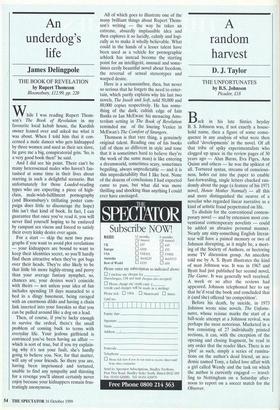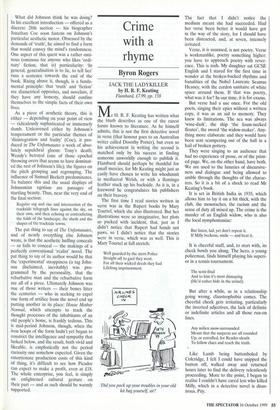A
random harvest
D. J. Taylor
THE UNFORTUNATES by B.S. Johnson Picador, f18
Back in his late Sixties heyday B. S. Johnson was, if not exactly a house- hold name, then a figure of some conse- quence in any analysis of what were then called 'developments' in the novel. Of all that tribe of spiky experimentalists who clogged up space in the review pages of 30 years ago — Alan Burns, Eva Figes, Ann Quinn and others — he was the spikiest of all. Tortured syntax, streams of conscious- ness, holes cut into the paper to enable fast-forwarding, single letters chucked ran- domly about the page (a feature of his 1971 novel, House Mother Normal) — all this and more distinguished the oeuvre of a novelist who regarded linear narrative as a kind of artistic fraud perpetrated on life.
To disdain for the conventional contem- porary novel — and by extension most con- ventional contemporary novelists — could be added an abrasive personal manner. Nearly any sixty-something English literat- teur will have a pained memory or two of Johnson disrupting, as it might be, a meet- ing of the Society of Authors, or hectoring some TV discussion group. An anecdote told me by A. S. Byatt illustrates the kind of man Johnson was. It was in 1967 and Byatt had just published her second novel, The Game. It was generally well received. A week or so after the reviews had appeared, Johnson telephoned her to say that he'd read the book and concluded that it (and she) offered 'no competition'.
Before his death, by suicide, in 1973 Johnson wrote nine novels. The Unfortu- nates, whose reissue marks the start of a full-scale attempt at a Johnson revival, was perhaps the most notorious. Marketed in a box consisting of 27 individually printed sections, it can, with the exception of the opening and closing fragment, be read in any order that the reader likes. There is no 'plot' as such, simply a series of rumina- tions on the author's dead friend, an aca- demic named Tony, a failed love affair with a girl called Wendy and the task on which the author is currently engaged — travel- ling to Nottingham on a Saturday after- noon to report on a soccer match for the Observer.
What did Johnson think he was doing? In his excellent introduction — offered as a discrete 28th section — his biographer Jonathan Coe soon fastens on Johnson's particular aesthetic motor. Obsessed by the demands of `truth', he aimed to find a form that would convey the mind's randomness. One aspect of this quest was a rather omi- nous (ominous for anyone who likes 'ordi- nary' fiction, that is) particularity: 'In general, generalisation is to lie, to tell lies' runs a sentence towards the end of the book. Rising above it, though, is a funda- mental principle: that 'truth' and 'fiction' are diametrical opposites, and novelists, if they have any honesty, should confine themselves to the simple facts of their own lives.
As a piece of aesthetic theory, this is either — depending on your point of view — ridiculously sophisticated or immensely dumb. Unleavened either by Johnson's temperament or the particular themes of 'disintegration and frailty' (Coe), it pro- duced in The Unfortunates a work of abso- lutely sepulchral gloom: Tony's death; Wendy's betrayal (one of those epochal throwing overs that seems to have dominat- ed the rest of Johnson's life); the figures on the pitch grouping and regrouping. The influence of Samuel Beckett predominates. To balance this and the usual displays of Johnsonian egotism are passages of startling beauty. Thus, near the very end of the final section:
Regular sag and rise and intersection of the tracicside telegraph lines against the sky, on their own, and then echoing or contradicting the folds of the landscape, the sheds and the shapes of the trackside towns.
The pat thing to say of The Unfortunates, and of nearly everything else Johnson wrote, is that the aesthetic huffing conceals — or fails to conceal — the makings of a perfectly conventional 'realist' novel. The pat thing to say of its author would be that the 'experimental' stroppiness (a tag John- son disclaimed, inevitably) was pro- grammed by the personality, that the rebarbative man and the rebarbative form are all of a piece. Ultimately Johnson was one of those writers — their bones litter the centuries — who in seeking to expel one form of artifice from the novel end up putting another in its place: House Mother Normal, which attempts to track the thought processes of the inhabitants of an old people's home, is frankly tedious. This is mid-period Johnson, though, when the iron hoops of the form hadn't yet begun to constrict the intelligence and sympathy that lurked below, and the result, both vivid and likeable, is emphatically not the period curiosity one somehow expected. Given the extortionate production costs of this kind of thing, it's difficult to see how Picador can expect to make a profit, even at £18. The whole enterprise, you feel, is simply an enlightened cultural gesture on their part — and as such should be warmly supported.



















































































 Previous page
Previous page